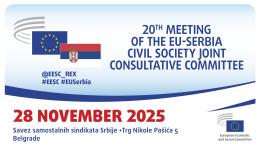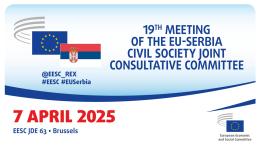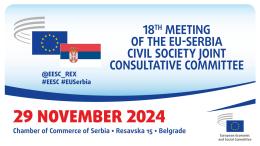European Economic
and Social Committee
Main navigation
-
À propos du CESE
ABOUT
The European Economic and Social Committee (EESC) is the voice of organised civil society in Europe.
Find out more about its role and structure at http://www.eesc.europa.eu/en/about
- Organisation politique
- Organisation administrative
- COOPÉRATION AVEC D'AUTRES INSTITUTIONS
- Règlements
-
Nos travaux
OUR WORK
The EESC issues between 160 and 190 opinions and information reports a year.
It also organises several annual initiatives and events with a focus on civil society and citizens’ participation such as the Civil Society Prize, the Civil Society Days, the Your Europe, Your Say youth plenary and the ECI Day.
Find the latest EESC opinions and publications at http://www.eesc.europa.eu/en/our-work/opinions-information-reports/opinions and http://www.eesc.europa.eu/en/our-work/publications-other-work/publications respectively.
- Avis et rapports d’information
- Documents
- Publications et autres travaux
-
Société civile et participation des citoyens
- Civil Society Week
- European elections 2024
- Prix de la société civile
- The Conference on the Future of Europe
- Passeport pour la démocratie européenne
- Votre Europe, votre avis!
- Initiative citoyenne européenne (ICE)
- The path to our industrial future
- Youth Climate and Sustainability Round Tables
- EU Organic Awards
- La société civile face à la Covid-19
- EESC stands with Ukraine
- Partenariats
- Relations avec les CES
-
Politiques
POLICIES
The EESC is active in a wide range of areas, from social affairs to economy, energy and sustainability.
Learn more about our policy areas and policy highlights at http://www.eesc.europa.eu/en/policies
-
Domaines politiques
- Agriculture, développement rural et pêche
- Action pour le climat
- Cohésion, politique régionale et urbaine
- Consommateurs
- Mutation numérique et société de l’information
- Union économique et monétaire
- Éducation et formation
- Emploi
- Énergie
- Entreprises
- Environnement
- Relations extérieures
- Services financiers et marchés des capitaux
- Droits fondamentaux et droits des citoyens
- Housing
- Industrie et mutations industrielles
- Affaires institutionnelles et budget de l’Union
- Migration et asile
- Recherche et innovation
- Services d’intérêt général
- Marché unique
- Affaires sociales
- Développement durable
- Fiscalité
- Transports
-
Domaines politiques
-
Agenda
AGENDA
The EESC holds nine plenary sessions per year. It also organises many conferences, public hearings and high-level debates related to its work.
Find out more about our upcoming events at http://www.eesc.europa.eu/en/agenda/our-events/upcoming-events
- Nos manifestations
-
Actualités & médias
NEWS & MEDIA
Here you can find news and information about the EESC'swork, including its social media accounts, the EESC Info newsletter, photo galleries and videos.
Read the latest EESC news http://www.eesc.europa.eu/en/news-media/news and press releases http://www.eesc.europa.eu/en/news-media/press-releases
- Président
-
Membres et groupes
MEMBERS & GROUPS
The EESC brings together representatives from all areas of organised civil society, who give their independent advice on EU policies and legislation. The EESC's326 Members are organised into three groups: Employers, Workers and Various Interests.
Find out more about our Members and groups at http://www.eesc.europa.eu/en/members-groups
- Membres
- Groupes
-
Sections & autres organes
SECTIONS & OTHER BODIES
The EESC has six sections, specialising in concrete topics of relevance to the citizens of the European Union, ranging from social to economic affairs, energy, environment, external relations or the internal market.
Find out more at http://www.eesc.europa.eu/en/sections-other-bodies
-
Sections / Commission
- Union économique et monétaire et cohésion économique et sociale (ECO)
- Marché unique, production et consommation (INT)
- Transports, énergie, infrastructures et société de l'information (TEN)
- Emploi, affaires sociales et citoyenneté (SOC)
- Agriculture, développement rural et environnement (NAT)
- Relations extérieures (REX)
- Commission consultative des mutations industrielles (CCMI)
- Observatoires
- Autres
-
Sections / Commission
- Ukraine







